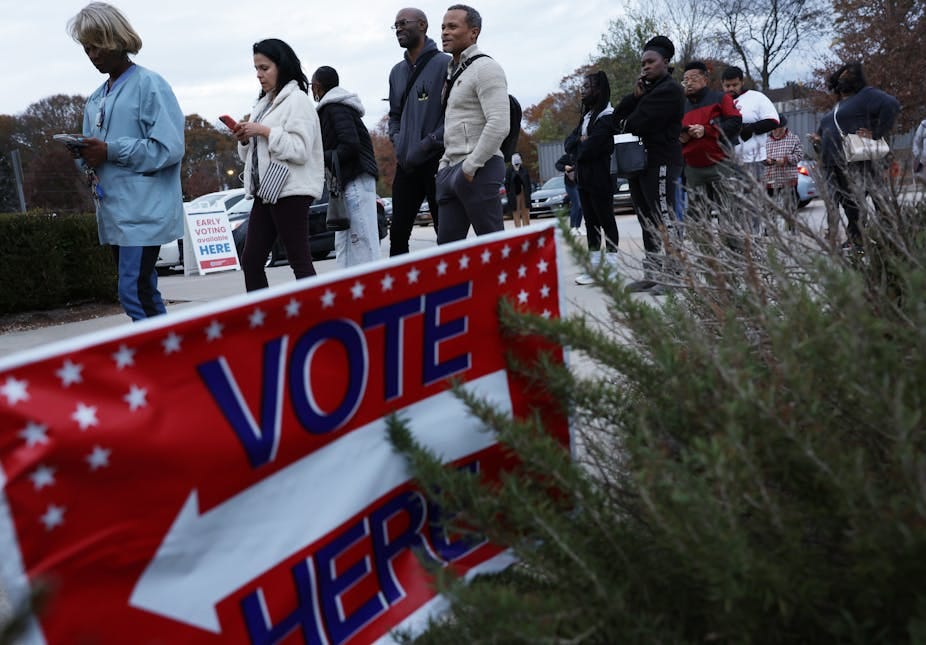The Minority Voters Who Exposed the Politics of Benevolence
There’s a reason Democrats are lashing out at minority voters, it’s a rearguard effort to reassert the hierarchy that’s inevitable in any coalition.
One of the great thinkers of our time is my dear friend Gregory Rodriguez. More an observer of human beings and our evolving culture, Rodriguez has written a short brief that captures an insightful rationale for the political results of last week. His thinking transcends partisan politics and pushes us to think far deeper than the red vs blue considerations that continue to erode our country.
Many readers here will remember Gregory from our popular podcast Americanata who ran for a year after the 2020 election.
After reading the essay I’m sure you’ll see why the podcast was so popular. Perhaps it’s time to revisit it.
It only took a little more than a week for Democrats to go from crying foul over a pro-Trump comedian's insulting remarks on Puerto Rico to hurling insults at minorities whose electorates had shifted to the right on Election Day.
Other than old-fashioned revenge, what much of the invective had in common was a desire to see how poorly those ungrateful minorities would fare without the protection of newly jilted liberals.
“I guess those Latinos [who voted Republican] will enjoy watching the Trump Presidency from wherever it is he deports them to,” wrote one Air Force veteran who calls herself a Democrat. "Fu** Latinos and Arabs,” wrote another man who publicly identified as LGBTQ and pro-Black Lives Matter. “There I said it. Hope you all get deported and banned.” Even a top writer for "Mother Jones," a leading liberal magazine, joined the fray, writing, "Perhaps massive deportations will affect how they see Trump."
Never mind the fact that voters are, by definition, U.S. citizens and therefore not subject to deportation. What matters is the source of this bitterness and what it tells us about the state of contemporary American liberalism.
If asked, a political scientist would tell you that politics in a democracy is simply the struggle among competing interests. And they'd be right. Group A is likely to have different interests than Group B and, since neither group is powerful enough to grab hold of the levers of government by itself, each will weigh whether joining forces with Group C or D or E would likely get them whatever they're after. The groups don't all have the same priorities. Indeed, some of their issues may be in direct conflict. But the hope is that all groups will get at least some of what they want from the party they support.
The currencies any given group can bring to a political coalition are many. Some groups bring a lot of money--cash from large donors helps to get the word out; another group may have privileged access to media sources; another may have a network of political organizations that can help push people to the polls, and some groups have lots of actual voters who can punch cards or tap touch screens at campaign's end. Put the resources of the coalition’s groups together and maybe they'll carry each other over the finish line.
But particularly since the 1960s, when a combination of the civil rights movement and the New Left injected a stronger current of morality into modern politics, another more subtle cultural currency came into play in political alliances, the politics of benevolence. While politics in America has always involved some level of pretense that high-minded principles trumped material interests, of the two major parties the Democrats became more convinced that politics was, first and foremost, the collective expression of virtue.
Talk to a Democrat from the Westside of Los Angeles and they're more likely to mention their party's generous social policies aimed at the less fortunate than about its approaches to the economic sector from which they earn a living. They may even explicitly claim that they vote against their own interests. But that's not true.
Let's say our hypothetical benevolent voter belongs to Group A, maybe he or she works or invests in the tech sector. Group A's political alliance with the less fortunate members of Group H or J can bring their chosen candidate more voters, because let's face it, Group A is a smaller demographic group than Groups H and J.
But such an alliance can also supply members of Group A with a sense of moral satisfaction. Because multi-group coalitions are inevitably hierarchical, members of the more privileged group can feel that they've protected the interests of groups who reside much lower than them on the totem pole. And in return, whether they admit or not, members of Group A often expect gratitude and party loyalty from members of Groups H and J.
But ironically, when people believe their political power is derived from their benevolence, it behooves them to maintain the social hierarchy from which their sense of righteousness arose. When sufficient numbers of Groups H and J abandon their alliance with Group A and join a new coalition, they not only undermine the privileged group's belief in its own benevolence, they threaten its political power. In other words, if enough members of Group H and J abandon the coalition, Group A doesn't get its own interests met.
Thus, the vitriol being directed at apostate minority voters is a rearguard effort to reassert hierarchy in a faltering coalition, to bully Groups H and J back into their place at the bottom of the totem pole. In addition to the revenge posts on X, more than a few analysts have suggested--without any evidence--that minorities who voted for Trump did so purely out of animus towards women or African Americans. All that proves is that while terms like racist or misogynist may have come into common use as part of a good-faith effort to reform social attitudes, today--with their meanings now stretched beyond recognition--they are just as likely to be used to impose social control over recalcitrant groups and individuals.
One thing is for sure, however, the nasty aftermath of this ugly election has already proven that there were always interests lurking beneath the Democrats' politics of benevolence.







I have thought a lot about this election. While I admit one of the reason's for my vote is motivated by my own self-interest as I depend upon Soc. Sec./Medicare and I fear the next administration will get rid of both, I also am concerned about the economy. I find it dismaying that voters say that Trump will be better for the economy.
Am I guilty of being a liberal elite when I ask does anyone else remember such things as :the numbers of us (including myself) who lost their jobs and were in the modern equivalent of bread lines to get food from charities during Covid, the PPP loans which benefitted many of our elected officials cumulatively in the millions of dollars while the rest of us were receiving checks for $1.4K or that employment figures had been rising under the Obama administration even though Trump tried to claim all such good news was fake until he took office?
Am I guilty of being an elitist when it concerns me that it seems as though people don't seem to remember history or economics? I was taught in both such classes that shortages increase prices, starting with the idea that labor shortages, due to wars, natural disasters or pandemics, result in increased wages and prices. But I was also taught the impact that large tariffs can have (Halwey-Smoot tariffs come to mind).
Everyone has their own filters on what happened. I appreciated reading someone else's perceptions. However, from the sources I have seen, Trump voters are mad at the superiority of Biden voters and their votes were partially in resentment of this superiority. My question (a long one with some background): Scammers got ahold of my bank account information last year and conned me out of some money. If I hear someone else telling a similar story and I warm them about the potentiality of being scammed, am I an elitist with a superiority complex because I try to prevent them from going through what I did?
Based upon what I have read, that would be the impression that some voters have of me. There was a huge element of self-interest in my voting choices, but I really did not and do not want to see anyone reap the potential whirlwind.
Thanks for your substack though. I really appreciate the intelligent observations from you and your readers.
What I have always loved about the conversations Mike and Gregory shared on Americanata was how Gregory always challenged me to look inward and examine my own views. Sometimes it wasn’t a comfortable experience, but if I was honest with myself and set my ego aside, I always felt that I came out the other side a better person. This article is a reminder of how much I appreciate Mr. Rodriguez.
This election was undeniably a catastrophic failure for Democrats. Frankly, the finger pointing in its aftermath is both embarrassing and pointless. Dems need to stop the nonsense, look inward, and work the fucking problem. It’s not rocket science. People like Mike and Gregory have done all the heavy lifting.